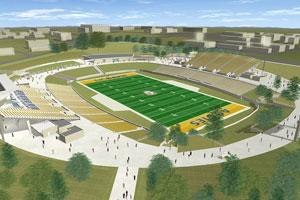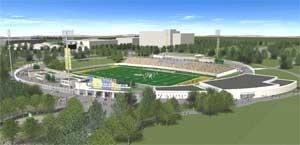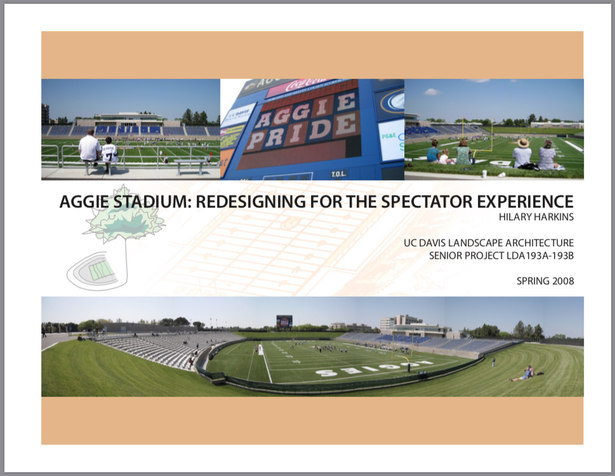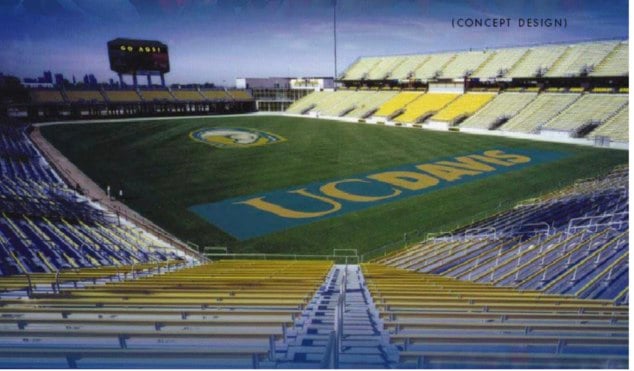-
 eastbayaggie
171Weren't there pictures of phase 2 and phase 3 designs around a decade ago? Those pictures disappeared a long time ago
eastbayaggie
171Weren't there pictures of phase 2 and phase 3 designs around a decade ago? Those pictures disappeared a long time ago -
 Zander
251Well here's a render of an enlarged stadium from Daviswiki. I don't know about Phases, though I assumed an athletics training center and/or expanded locker room building was the next logical step.
Zander
251Well here's a render of an enlarged stadium from Daviswiki. I don't know about Phases, though I assumed an athletics training center and/or expanded locker room building was the next logical step.
https://localwiki.org/davis/Aggie_Stadium/_files/sign-stadium.jpg/_info/ -
 eastbayaggie
171
eastbayaggie
171
They had a picture of the 30k stadium for phase 3 when the stadium was initially getting built. It looked relatively massive. The administration sounds like they're putting an effort not to talk about that for the past seven years or so - perhaps due to lack of funding interest. -
 Zander
251You're not talking about this one by any chance are you?
Zander
251You're not talking about this one by any chance are you?
http://www.championshipsubdivision.com/wp-content/gallery/uc-davis-aggies-aggie-stadium/Aggie-Stadium-2.jpg
I kind of get not wanting to talk about it; focusing on filling 10.7k should have been the priority. If this attendance is sustained, they'll need to at least comment on it though -
 eastbayaggie
171
eastbayaggie
171
We're talking about the same concept design. I think the one I saw was more of a cartoon picture - perhaps a view more from the top. However,it should be the same concept design as your picture. -
 smarterray
77I I know which plan you're talking about. I found just a piece of it here: http://www.stanspecs.com/projects-broadathletic
smarterray
77I I know which plan you're talking about. I found just a piece of it here: http://www.stanspecs.com/projects-broadathletic

I remember the actual full plan had multiple stages--this was one of the early expansion plans. -
 smarterray
77Here's an article that explains the delays, which eventually forced the project to become smaller due to rising steel costs: https://www.ucdavis.edu/news/multi-use-stadium-project-faces-delay-regents-postpone-review/
smarterray
77Here's an article that explains the delays, which eventually forced the project to become smaller due to rising steel costs: https://www.ucdavis.edu/news/multi-use-stadium-project-faces-delay-regents-postpone-review/

-
 eastbayaggie
171
eastbayaggie
171 -
 ucdavisaggie05
142I can’t find it on the internet, but I downloaded it ages ago. Here’s a screenshot.
ucdavisaggie05
142I can’t find it on the internet, but I downloaded it ages ago. Here’s a screenshot.
-
fugawe09
375So I have spent the past few years project managing stadium/arena construction and renovation for a multi-facility owner. (Anyone in Athletics feel free to PM me if you wish). I did a brief count, and there are about 8800 fixed seats, which means they figure about 1000 per endzone. Measuring, they are allocating about 15sqft per person on the grass, which is typical for a "non concentrated occupancy". I don't know Davis code, but nationally, you provide 0.2" of exit width per occupant. I count 18 pedestrian gates, call em 10' wide and we're right on the money.
To expand Aggie Stadium, the seats are the cheap part. The money gets tied up in supporting infrastructure IF that is not already in place, as well as administrative construction soft costs. For example, in my jurisdiction, I have to keep a ratio of 1 toilet per 90 seats which is supposed to ensure a wait time of less than 3 minutes. Let's just say that's what the building department at UCD uses, that would mean AS has about 120 toilets. Even simple restrooms are more expensive than you think. Now, hopefully the planners recognized this as a possibility and upsized the utility loops in the stadium. Costs very little at initial construction but gets very expensive to redo later.
Now, what expansion would make the most sense? Until we routinely break 10,000, the only thing that makes sense is to negotiate a standing room oversell with the fire marshal and bring in portolets if the math requires. For a permanent structure I would say a second deck on the Aggie Pack side if you could commit to mostly 7pm games. Cantilevered over the AP would be expensive, but a steel superstructure over the walkway and restroom buildings with aluminum bleachers would be economical. In fact you can see the gaps in the restroom buildings are spaced right for stairways going up. Lets say you did 20yd to 20yd, so 5 sections or roughly 2300 seats if its the same size sections as existing. You'd probably get the same net gain filling in the end zones, but in the process take away a popular family hillside and replace it with poor sightline seats that aren't going to command much premium - unless you move the AP to north end zone like Toomey. That was a lot of fun down there. But back to brass tacks, all that concrete is going to cost you more than a steel structure. That kind of poured in place concrete is a lot of material and labor intensive... gotta get it graded, stabilized, concrete trucks there, formed up, finishers working and everything measured right in the field. Off by an inch? Get the jackhammers. With an engineered steel structure it all comes precut from the factory with less opportunity for expensive field screw ups.
As to the comment about the cost of steel, that's probably not what broke the budget on Aggie Stadium. In real life, they built it at a construction peak - shortage of workers and supplies in a boom drives general contractor prices, kind of like right now. If they had waited to build it in the recession, you would have found bricklayers and plumbers working at a discount. Also oil prices were spiking, which had to have influenced the cost of the massive earthmoving effort to dig that bowl and then truck in all that concrete. Throw in a wet winter and the GC was able to justify his underbid - note that up to that point the contractor had mainly only built apartment buildings. Looking at comparables, you probably could have done a 20,000 seat (plain but functional) surface stadium with a qualified contractor for the price we paid.
Ok, end of the novel. I could talk at length on this, so let me know if you want more. -
 quadshock
88Good stuff! Great to read insight from alumni experts outside of the sports themselves. Informative and well-written.
quadshock
88Good stuff! Great to read insight from alumni experts outside of the sports themselves. Informative and well-written.
So if we're being realistic, if Hawk can show that he can fill seats, then in the next economic downturn would be ideal time to expand. However, my guess is they would decide to build now if they want to start 2 years down the road. Would it be ideal if the school had a real plan in place, then just execute when the timing and pricing is right? I'm talking about beyond just mocks and renders. -
fugawe09
375In my mind the first thing you have to do is define what it is that needs to be built - how many seats are in scope and are there key limiting factors, like can't build above a certain height, must provide a home for endangered woodpeckers, or whatever. The trap here is to define a budget that sounds good and then try to back into a scope that fits. Invariably, 3 things happen - 1. the project takes forever and inflation happens to your costs but your funding stays the same, 2. you find an architect/contractor who say they can make it work but when push comes to shove it turns out they assumed you wanted inferior materials and that they could get every subcontract negotiated below market rate, 3. people lie about what is realistic - contractors who want the job, and PR people who don't want to walk back public promises.
So how many seats do we need to fill current or projected demand? This needs to be a real number, not a build-it and maybe they come number. Every dollar you spend on seats that never fill could be going to a scholarship endowment. In fact you probably have to emotionally acknowledge that the whole endeavor makes no financial sense. Half the football season is before school starts. Not going to fill the stadium. So we are building this for 3 or 4 days out of the year. To fill the stadium we are discounting tickets to $15 or $20. There is no business case to invest thousands per seat in capital plus annual maintenance for annual revenue of less than $100 per seat. Now, there are impossible-to-quantify things like more people at a fun game = more donors someday. Don't let the bean counters try to smoke and mirror a performa to rely on this. Acknowledge we are building a strategic value money pit because we love Aggie Football and be emotionally OK with this.
So, for example sake, we decide we need 2300 seats. Doesn't matter where they go or what they look like, bottom dollar is we need 26 more toilets and 39 more linear feet of exits. More concessions and ticket booths? Food trucks pads and mobile ticketing are probably a better investments. These are the non-sexy items that executives hate to fund. But it is critical to do the homework here because you might find something unexpected, like if for example, the sewer force main in LaRue Rd can't handle one more toilet without upgrading the lift station at great expense. Then you have to decide if the project will be burdened with that critical infrastructure or if there are other funds for that. Now you can come up with a seating concept with the features you want. At this point you can start to come up with a real cost. It of course costs money to do all this homework and you're not even sure if you're doing the project yet or what it costs. Executives hate spending money to realize something is a bad idea, but you can't look at this wasted money. It would not be a terrible idea to invest in this homework now and develop a strategy with meaningful estimates and timeline.
It is hard to know when the market is in a peak or valley when you are in it, but ideally, you fundraise when the market is good, go to design and construction in a low so that you can open when the market is rebounding. Your advantage for building when the market is cooler with either donated or bond money is that contractors are hungry because corporate capital projects dry up to prop up quarterly stock prices. But if you have the money and need the seats now, don't wait for a recession because inflation may bite you in the meantime. -
 zythe
201
zythe
201
Do the ordinances change if you are UC land?
I understand that private developments sometimes get more stringent requirements (i.e. put in infrastructure and such). Since this is “California owned land” isn’t there a way to bypass a lot of the added costs mentioned? -
 movielover
723Great feedback. Administrative and gender equity issues supposedly cut Dobbins Stadium's budget ON HALF!
movielover
723Great feedback. Administrative and gender equity issues supposedly cut Dobbins Stadium's budget ON HALF!
The major Stanford donor (experienced major office developer in Silicon Valley) for their new football stadium reportedly had one condition: he ran the project. Three crews, 24 hours per day (no OT?), got it done reportedly for half the cost done elsewhere, in 1 year?
Could you give us a rough guess or realistic range on adding 5-10,000 seats? $10-20 Million?
Right now, I think many would be thrilled with a new Athletic Training Facility.
Dr. Mike, I read the attendance figure requirement (14,000-15,000?) is very fungible. San Jose doesn't draw a ton of people.
I'd rather have 10-12,000 packed into AS a few times a year than 10-15,000 empty seats.
I'm told the UC soft costs are enormous, many depts will want their toll. -
fugawe09
375You'd think. It's not like UCD is standing in line down at the Yolo county building department, but they are still going to follow state building code, National Electric Code, National Fire Protection Association code, plus self-imposed standards like gender neutral restrooms and breastfeeding support rooms. My guess is that the university has its own building official along with the fire marshal. They may well be tougher than Yolo county inspectors. At the end of the day the architects and engineers aren't going to want the liability of fudging things. -
fugawe09
375I would suggest $1500-$2000 per seat based on comps. For athletic training center, Sac State spent about $650/sq ft in today's dollars and Cal about $1150/sq ft.
If you have a complete design, a good scheduler, and qualified tradespeople, you can get done quickly. Many big projects start construction before design is done, leading to delays and rework. -
 movielover
723Thanks!
movielover
723Thanks!
$1500 × 5,000 seats = $7.5 Million
$2000 x 5,000 seats = $10 Million
One major GC on civic projects reportedly had a strategy: bid jobs dirt cheap, break even, and make it all up on change orders.
Last I read Cal is in a world of hurt re their athletic projects and may have to cut sports. -
 69aggie
420Fugawe09 thanks for your significant input. Civil engineering is not often seen on this site. We are more of a yearning group- we want what we cannot have, i.e 10,000++ fans at every football game. We have non-existent funding to do this “expansion”. But I have a new plan: if we charge $1 for each toilet use ($1 for #1 and $2 for #2) and if We charge $2-4 for each breastfeeding station use (depending on number of breastfeeds), wont that cut down on usage and bring in funding? And if we go all neutral gender restrooms ($2 each use) wont that bring in more revenue? Then we get everyone coming into the game to sign waivers that they don’t need alll your dumb “fire exits” they just want to SEE THE GAME! Come on Fuga! You are ruining things for us.
69aggie
420Fugawe09 thanks for your significant input. Civil engineering is not often seen on this site. We are more of a yearning group- we want what we cannot have, i.e 10,000++ fans at every football game. We have non-existent funding to do this “expansion”. But I have a new plan: if we charge $1 for each toilet use ($1 for #1 and $2 for #2) and if We charge $2-4 for each breastfeeding station use (depending on number of breastfeeds), wont that cut down on usage and bring in funding? And if we go all neutral gender restrooms ($2 each use) wont that bring in more revenue? Then we get everyone coming into the game to sign waivers that they don’t need alll your dumb “fire exits” they just want to SEE THE GAME! Come on Fuga! You are ruining things for us. -
 DrMike
1.2kI thought the NCAA minimum attendence (not capacity) was 17000, but. As movielover points out, that’s far from a hard requirement. I’ve linked a list of all FBS stadium: Idaho (16000) and UN-Charlotte (15000) were both below that. All MWC are at least 29000, so you’d think that’s a level where they would take a prospective new school seriously.
DrMike
1.2kI thought the NCAA minimum attendence (not capacity) was 17000, but. As movielover points out, that’s far from a hard requirement. I’ve linked a list of all FBS stadium: Idaho (16000) and UN-Charlotte (15000) were both below that. All MWC are at least 29000, so you’d think that’s a level where they would take a prospective new school seriously.
I thought filling one berm with seats added a couple thousand. It’s the addition of second decks that push it way up.
http://www.collegegridirons.com/comparisons.htm -
 BlueGoldAg
1.6kHahaha...that's funny!
BlueGoldAg
1.6kHahaha...that's funny!
I'm all for continuing to get better until we are consistently in the hunt for the Big Sky Championship and getting into the playoffs and making a run at the FCS National Championship. When we are doing that we will be playing in front of a packed house at Aggie Stadium on a regular basis. Heck, look at the crowd we had Saturday and we're just getting started! -
 DrMike
1.2kwe are finally getting back to the 2007 attendence levels. be nice to sustain a 9000+ level for a year before we start talking about expanding. Here is a throwback:
DrMike
1.2kwe are finally getting back to the 2007 attendence levels. be nice to sustain a 9000+ level for a year before we start talking about expanding. Here is a throwback:
2007:
Western Washington : 9690 (hotter than the surface of the sun)
Northeastern : 7140 (rain)
Poly : 10743
South Dakota State : 9375
San Diego : 8876 (Epic game)
i think we've finally gotten back to a season ticket level on par with 2007, so that helps. should be able to build on that in the future. -
fugawe09
375My cost estimates are just a wag without really knowing site conditions or having a conceptual design so its just kind of for fun, but normally I charge people for this!
Interesting thought charging for the loo. Although I feel like its only fair to include a $1 token with every couple beers and a $2 token with every order of pulled pork nachos.
I tend to agree with you that the business case for a stadium seating expansion isn't quite there yet. But if this year isn't just an outlier it may be something to think about down the road. There are other expansion considerations too. Limited access party decks have become pretty common and several other Big Sky teams have justified a handful of skybox suites. -
 69aggie
420For me, I would hate “sky boxes” at Aggie Stadium. They just don’t fit my image of the future of Aggie sports. And “limited access party decks” at UC Davis? well thats not going to fly either. Fuga, this is not an easy job. And you’re doing great trying, but remember this is a very, very hard place to do your good stuff. But, Stay on it. We love your ideas!
69aggie
420For me, I would hate “sky boxes” at Aggie Stadium. They just don’t fit my image of the future of Aggie sports. And “limited access party decks” at UC Davis? well thats not going to fly either. Fuga, this is not an easy job. And you’re doing great trying, but remember this is a very, very hard place to do your good stuff. But, Stay on it. We love your ideas! -
 CA Forever
979I don't see why skyboxes would be out of the picture someday. Like Fugawe said, some Big Sky schools already have them. Good place for potential investors to watch a game.
CA Forever
979I don't see why skyboxes would be out of the picture someday. Like Fugawe said, some Big Sky schools already have them. Good place for potential investors to watch a game.
Welcome to Aggie Sports Talk!
AggieSportsTalk.com, the pulse of Aggie athletics. The home of Aggie Pride. Create an account to contribute to the conversation!
More Discussions
- Terms of Service
- Useful Hints and Tips
- Sign In
- Created with PlushForums
- © 2026 Aggie Sports Talk















